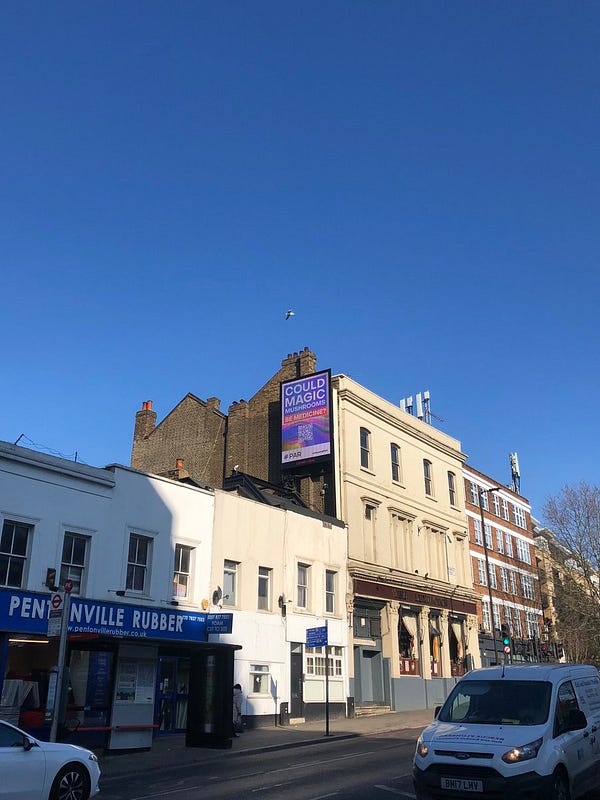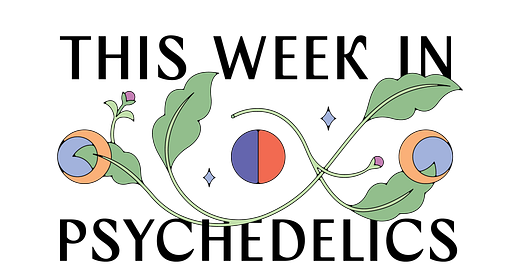Legal faceoff between doctor and DEA continues, bills advance in Arizona, Virginia, Hawaii, and Utah, and regulating psychedelics in the EU
Plus: UK psychedelics ad campaign, and sociability and psychedelics
Happy Friday, and welcome back to The Microdose, an independent journalism newsletter brought to you by the U.C. Berkeley Center for the Science of Psychedelics.
Legal faceoff between doctor and DEA continues
For more than two years, Seattle-based Dr. Sunil Aggarwal has been trying to figure out how to legally provide psilocybin-assisted therapy to his patients. Under federal Right To Try laws, patients with a terminal illness can seek experimental treatments if they’ve exhausted all other treatment options. But because psilocybin is a Schedule I drug, it’s unclear how physicians like Aggarwal could access it to treat patients outside of clinical trials. Aggarwal asked the DEA for guidance, but the agency replied that Right To Try laws don’t override the restrictions psilocybin is subject to as a Schedule I drug. After a series of lawsuits and appeals, Aggarwal is still unable to access psilocybin for his patients.
Last week, Aggarwal and his legal team filed an appeal requesting that Aggarwal be granted access to psilocybin for his patients, that the court declare the DEA’s previous actions unlawful, and “instruct DEA to request from the HHS Secretary a scientific/medical evaluation and recommendations” to assess psilocybin’s Schedule I status.
In the appeal, the lawyers write that the DEA’s “non-response…is hardly an accident,” and that the agency “applies unlawful interpretations of the [Controlled Substances Act] when it handles rescheduling petitions as a matter of course.” They argue that despite psilocybin’s classification, there is sufficient evidence that psilocybin has potential for medical use.
Alongside the appeal, researchers, clinicians, and organizations have submitted amicus briefs urging the court to consider historic precedent and what a successful appeal could mean for patients. In their brief, the National Organization for the Reform of Marijuana Laws (NORML) writes that while it has been challenging marijuana’s Schedule I status for years, the DEA has been a barrier to that despite a “voluminous and unassailable body of scientific research” – and that “here, the DEA again neglects and avoids medical and scientific evaluation of the next promising frontier of medicine: psilocybin.” The Veteran Mental Health Leadership Coalition and Reason for Hope writes that “the DEA must properly interpret the CSA so as not to impose unwarranted barriers to research and access to an FDA breakthrough therapy – psilocybin – with potential to provide significant benefit to patients with life-threatening forms of depression.”
The outcome in this case could have larger implications for how the DEA reviews petitions for drug rescheduling. “We are positioned here to have the court instruct the DEA that it must follow proper procedure when it receives these petitions, meaning it must obtain a scientific and medical evaluation from the agencies with expertise to provide that,” says Kathryn Tucker, an attorney for Aggarwal and the Director of Advocacy at the National Psychedelics Association. “This case could not only have huge ramifications for opening access and rescheduling psilocybin, but for how all future rescheduling petitions are considered. And that's a big deal.”
The State of Psychedelics: Bills advance in Arizona, Virginia, Hawaii, and Utah
In January, we reported on Arizona’s House Bill 2486, which would earmark $30 million of the state’s general funds for psilocybin research grants, and establish a psilocybin research advisory council to review applications. The bill was referred to the state’s Military Affairs and Public Safety Committee, which discussed the bill at a hearing on Monday attended by advocates and veterans. The bill passed out of committee after a unanimous vote, and now heads to the House Appropriations Committee.
Virginia’s Senate Bill 932 is also moving forward. The bill, which would reclassify psilocybin from a Schedule I drug to Schedule III under state law, passed the Senate last week and is now in the hands of the House Rules Committee.
Hawaii’s Senate Bill 1454 would establish a working group to examine the latest research and policy around therapeutic psilocybin and potentially draft a plan to roll out psilocybin therapy or products in the state. The bill passed the senate last week. The state senate also passed SB 1531, which creates a “beneficial treatments advisory council” to review laws and procedures around treating mental health, including developing “a long-term strategic plan to ensure the availability of therapeutic psilocybin, psilocybin-based products, and [MDMA] that are safe, accessible, and affordable for adults twenty-one years of age or older.” At a hearing on Wednesday, the state House discussed SB 1454’s companion bill, HB 1337 and SB 1531’s companion bill, HB 1340.
Finally, in Utah, Senator Luz Escamilla’s Senate Bill 200, which would establish psilocybin services in the state, is currently in the Senate Bills Committee, and the Office of Fiscal Analysis has just submitted an analysis of the bill’s costs.
Want the latest psychedelics news? Subscribe! (It’s free!)
Regulating psychedelics in the EU
As Australia will allow therapeutic use of psilocybin and MDMA later this year, and experts speculate that those substances could receive FDA approval in the U.S. in the next year or two, it’s clear the regulatory landscape around psychedelics is changing quickly. This week’s issue of The Lancet included a paper on psychedelics regulatory challenges in the European Union, published by psychiatry, pharmacology, and psychology researchers working with the European Medicines Agency (EMA) and European College of Neuropsychopharmacology, a non-profit science association.
The authors lay out issues with research methodology that could be barriers to regulatory change, like a lack of proper blinding between active and placebo conditions, and, in some cases, the lack of a placebo condition altogether. Studies will also need to establish how much psychedelics “add value” compared to psychotherapy, the authors write, and researchers will need to more closely study the drugs’ safety by carefully cataloging adverse effects and determining which other drugs might interact poorly with psychedelics.
The EMA can help with some of those things, the authors write, by specifying recommended procedures for researchers to follow. The agency can also solicit feedback from regulators and other public entities like the Health Technology Assessment to prepare for and implement new regulations.
Also noteworthy: the paper includes an extensive list of authors’ declared interests, which includes receiving consulting fees, grants, and honoraria from psychedelic and pharmaceutical companies including Biogen, Clerkenwell, and Compass Pathways.
A comic from cartoonist Paul Noth illustrates the difficulty of properly blinding studies:
UK psychedelics ad campaign
After Brexit, EU’s regulations no longer apply to the UK, but advocates there are also eager to advance psychedelics research. This week, a group called Psilocybin Access Rights (PAR) launched an ad campaign in London. Six billboards across the city ask: “Could magic mushrooms be medicine?” along with a QR code that directs to PAR’s website. The group’s site calls on supporters to sign a petition asking the UK government to reschedule psilocybin from a Schedule 1 drug to Schedule 2 under the country’s Misuse of Drugs Regulations 2001 so that it’s more easily accessible to researchers.
The group lists a variety of organizations among its collaborators, including the Psychedelic Access and Research European Alliance (PAREA), psychedelics biotech company HAVN Life, the Canadian Psychedelic Association, the veteran-focused Heroic Hearts Project, and psychedelic analysis company Psychedelic Alpha.



Sociability and psychedelics
MDMA has been called the love drug for the feelings of connection and sociability it can inspire, and in recent years, researchers have posited that the drug could be used to treat impairments in social functioning. A new study published in this week’s issue of Scientific Reports investigates the link between MDMA (as well as other classic psychedelics) and social functioning.
In their analysis, the researchers, led by Harvard psychology PhD student Grant Jones, used data from the National Survey on Drug Use and Health (NSDUH), an annual survey that collected data on over 200,000 Americans’ substance use and mental health between 2015 and 2019. NSDUH asked participants questions about their social functioning, such as how difficult, on a scale of 1-4, they found it to interact with strangers or participate in social activities, and whether or not their mental health prevented them from engaging in such interactions. They compared this data with participants’ self-reported drug use. They found that people who have tried MDMA were less likely to report difficulty dealing with strangers and participating in social activities. Mescaline use was also associated with less difficulty in dealing with strangers, while LSD use was associated with increased likelihood of difficulty dealing with strangers.
These associations leave causality unclear: do people with fewer social functioning issues gravitate towards using MDMA? Could MDMA improve social functioning? Or are there other factors mediating these correlations? The authors provide a few hypotheses. It’s possible, they write, that MDMA causes long-term changes to the brain’s neurotransmitter systems, or reduces the reactivity of the amygdala — the brain’s fear center — in social situations. Perhaps it increases empathy or motivation to be social, or perhaps there are other “third party” factors at work here, like personality traits, political affiliations, and spirituality. Overall, though, they write, “this study can pave the way for future experimental studies that assess whether these substances can support social functioning, as well as others that allow for better understanding of potential risks related to these compounds as well.”
Washington Post columnist Steven Petrow hoped his ketamine experiences would be transformative. Instead, he felt terrified and disappointed. “Completely engulfed by an unyielding darkness,” he writes.
Inverse reports on an “understudied” psychedelic: mescaline.
Veteran Marcus Capone is at the center of a new documentary about the use of psychedelics to treat former Navy SEALs’ PTSD and traumatic brain injury.
The Ohio State University is recruiting veterans near the Columbus, OH area for a study on the safety and efficacy of psilocybin-assisted psychotherapy to treat PTSD.
You’re all caught up! Have a great weekend. We’ll be back in your inbox on Monday with a new issue of 5 Questions.
If you know anyone who might like the latest on psychedelics in their inbox, feel free to forward this to them, or click below.
Got tips? Email us at themicrodose@berkeley.edu.











Thanks for the updates from the EU and UK!
Schedule 1 classification has nothing to do with science and everything to do with politics. By definition Schedule 1 means highly addictive with no medical use. THC was approved by the FDA in 1985 and yet cannabis is still Schedule 1. Tobacco, on the other hand, is highly addictive and has no medical use. Time to make it Schedule 1?